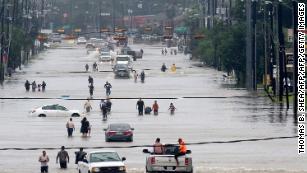https://www.cnn.com/2019/03/08/us/climate-change-tv-weathercaster/index.html
(CNN)When most people tune in to their local TV news station, they’re used to learning whether it’s going to rain tomorrow from the trusted, familiar voice of their favorite TV meteorologist or weathercaster.
Increasingly, those viewers are also learning about the effects of climate change in their own communities from those same trusted voices.
It was once thought to be a topic to be avoided, but many on TV have become emboldened to talk about this subject as their own understanding has evolved.
Ed Maibach, director of George Mason University’s Center for Climate Change Communication, has surveyed TV weathercasters since 2010 on their opinions on climate change, as well as the incorporation of the topic into their broadcasts.
His results show a dramatic shift in the past 10 years.
In 2010, the broadcast community was split right down the middle: Fifty percent of those surveyed were convinced that humans were causing climate change, and 50% weren’t. Of the half who weren’t, most acknowledged that the climate is changing, they just didn’t see the human connection.
What Maibach found most disturbing, however, was that a significant amount, roughly 20%, didn’t even acknowledge that the climate was changing.
In his most recent survey, conducted in 2017, that number has dropped, and now 95% of broadcasters believe that the climate is changing.
Additionally, 85% of those surveyed see humans as the cause.
Getting local with global warming
What changed?
Maibach points to an initiative launched in 2010 by Climate Central, a nonprofit news organization of scientists and journalists who research and reports on climate change, called Climate Matters. As an academic researcher, Maibach partners with Climate Central on the project, tracking the use of the materials and investigating their effectiveness.
The program provided weathercasters with tools they previously lacked: localized climate data tailored to a specific TV market.
Jim Gandy, a local TV meteorologist in the deep red state of South Carolina, launched the pilot Climate Matters project, and Maibach gauged the success of the program by surveying viewers from Gandy’s and competitors’ stations.
“We found that the more viewers watched Jim’s station, the more likely their views on climate change evolved,” Maibach said.
“They recognized that it was happening, and it was happening to them locally. Those results gave us confidence to know that when broadcast meteorologists talked to their audiences about climate change, it helped viewers understand that this is real and it’s impacting them.”
Gandy strives to avoid the politics and stick to the facts of the science.
“When you tell people that this is the fifth hottest summer on record, they kind of look at you like, ‘really?’ “
Gandy has been tracking trends in his state and noticed something that really got his attention. “In heat waves of the past, it may have been blazing hot in the daytime; at least you got a little bit of relief at night. You’re not getting any relief at night here now.”




